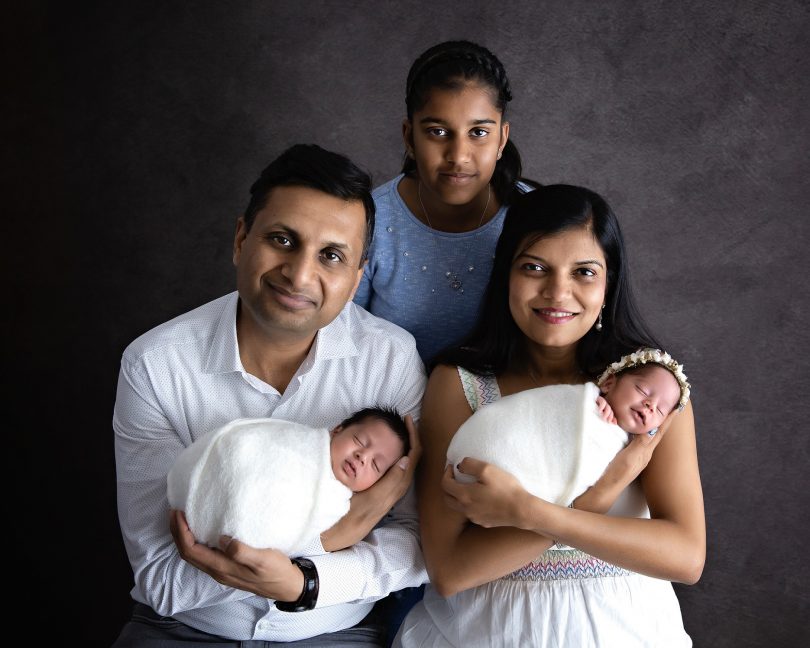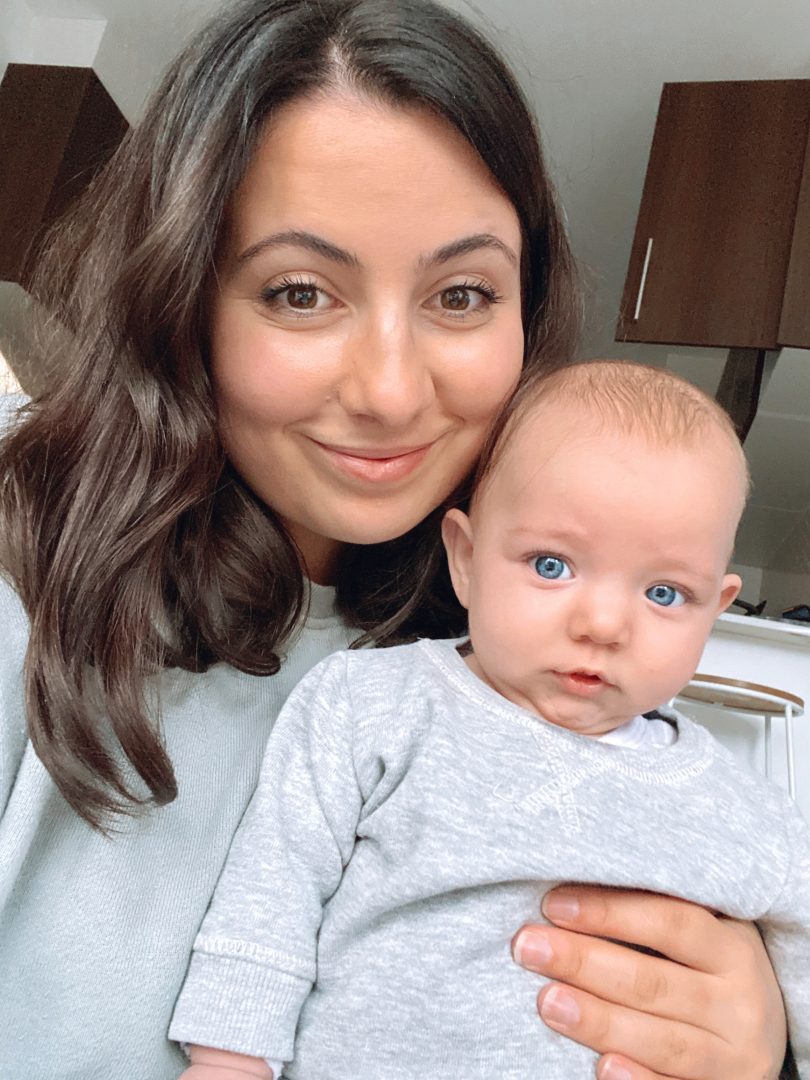
Namita Mittal and Tarun Jain with their twin babies and eldest daughter. Photo: Supplied.
Namita Mittal has a new perspective on balance after giving birth to twins during the height of the COVID-19 lockdown.
Not only are both hands full with her newborns, but the pathologist at Canberra Hospital is also juggling her eldest daughter’s schooling from home without the usual level of support from her extended family.
Namita is one of 750 women in the ACT and southeast NSW whose experience of giving birth during this year’s bushfires and COVID-19 pandemic has been documented in the Mother and Child 2020 survey conducted by researchers from the Australian National University, University of Canberra and University of Wollongong, in partnership with Canberra Health Services and NSW Health.
Namita’s husband, Tarun Jain, is a doctor, but the couple’s balancing act of continuing to work while looking after their newborn babies, helping their eldest daughter and navigating through the COVID-19 pandemic has caused a great deal of anxiety.
“None of my family could fly to visit me from India,” says Namita. “Having a family member come to stay with you 24/7 to help with the babies is important to me, and different from hiring help. There was extra work for me to do and not having that family support was the main thing that caused me anxiety.
“When my daughter was born, my mum came so I had no experience of how to handle everything myself. Recovering from a cesarean section with two newborns and one child doing school from home, I was really anxious having to do this without my mum.”

New mum Sophie Brian and four-month-old Parker. Photo: Supplied.
Sophie Brian and her partner, Daniel Schorn, also brought their first child, Parker, into the world during the COVID-19 pandemic. Parker was conceived during the bushfires and Sophie recalls being told to be very careful of bushfire smoke while outside.
“My GP told me not to go outside while the bushfire smoke was around,” she says. “So I was wearing a mask back then when I did have to go out.”
At the midway point of the Mother and Child 2020 survey, researchers are urging more women to enrol in it to increase the strength of the findings to at least 20 per cent of babies born in the ACT and southeast NSW regions during the bushfires or COVID-19. They are also encouraging mothers from Aboriginal, Torres Strait Island and multicultural communities to share their experiences.
The survey highlights the challenges women and their babies faced throughout the bushfires and pandemic as well as their adaptability and resilience in both the short- and long-term.
Lead researcher, Professor Christopher Nolan from ANU, says the results will be used to form a series of recommendations on how to improve our health system and emergency responses during major crises.
“We need to listen to the experiences of these mothers and look at the challenges they faced during the bushfires and pandemic,” he says. “Understanding these challenges is the only way we can look to improve these systems in the future.”
Professor Nolan says almost seven out of 10 pregnant women and new mothers – 65 per cent – in the ACT and southeast NSW say they were severely exposed to bushfire smoke during the past summer.
Almost nine out of 10 – 85 per cent – said they isolated themselves and their family at some point in 2020 due to the COVID-19 pandemic.
Dr Amita Bansal from the ANU’s College of Health & Medicine says mothers and babies have been disproportionately affected, and the long-term impact of bushfires, bushfire smoke and COVID-19 on the health of mothers and their babies is unknown.
“If a majority of women felt that exposure to smoke was severe, this may influence their stress levels,” she says. “Isolation from COVID-19 will most likely add to this stress. Pregnancy itself is an overwhelming period for many women, and any additional stress can be detrimental to the health of the mother and her child.”
Dr Bansal says it is important researchers get results that more accurately reflect the population to better prepare our emergency response and health care systems in the future.
“We want to hear the unheard, uncover the unknowns and best represent our diversity so we can better inform clinical practice and make policies that are more inclusive; inclusive of our women and children; and inclusive of our diverse perspectives and community,” she says.
The Mother and Child 2020 survey is available to anyone who was pregnant or had a baby no older than three months on 1 February, 2020, or became pregnant by 30 April, 2020, in Canberra or southeast NSW. All mothers, exposed to bushfire smoke or not, are also welcome to be involved.
Original Article published by Michael Weaver on The RiotACT.






